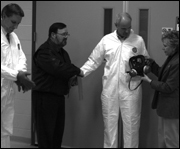
If your business card reads “Risk Management and Safety,” you have many hats to wear. And sometimes—as members of Notre Dame’s risk management team will tell—you wish you could pull one of them right down over your eyes.p. But the whole point of risk management is, if it’s risky, gruesome, life- or health-threatening or just something that can be prevented, the staff has to deal with it.p. To the students attempting back flips on a trampoline in order to stick upside down to a Velcro wall, the risk management representative who stops the show is a killjoy. But in the grander scheme of University safety priorities, they are seen as friendly saviors.p. The Notre Dame Risk Management and Safety staff sees it all, from fire drills to chemical spills; from carpal tunnel syndrome to stadium evacuation planning.p. “We try not to be nitpicky— try not to be like a regulatory agency — but that is our job, and lots of things could go wrong if we don’t do our job,” said Robert Zerr, the University’s risk management and safety director. “We do see some of the bad things.”p. Zerr came to Notre Dame 25 years ago as a health physicist to compel the safe use of radioactive materials on campus. Over the years, he has seen a formal risk management operation develop as the health and safety department has grown, and as the division took on the tasks of purchasing insurance and managing risk situations. Today, 10 full-time staff and three part-time students serve the campus.p. “We have a great staff,” said Zerr, with the kind of appreciation that hints: You’d want to work with great people, too, if you did what we did.p. Making sure the University has adequate property insurance or state-of-the-art fire detection equipment isn’t the hard stuff. When you oversee the safety of all faculty, staff, students and visitors on the Notre Dame campus, the issues can get a bit depressing, Zerr admitted. In fact, they can become confrontational. (Who among us wants the job of nixing a proposal to install a campus crane for bungee jumping?)p. Certainly risk management staff members will say their role in working with students groups and events approval is colorful. It’s no surprise that when an attempt to lower risks of a proposed activity doesn’t work (OK, so what about a smaller crane?), they often must just say no.p. “We don’t mind being the bad guy; we see it as a way to educate,” Zerr said.p. Providing a safe environment for faculty, staff, students and visitors means building relationships throughout campus. Zerr and his staff have established seven safety committees to be the eyes and ears of the department. With the myriad of responsibilities that fall within the risk management charge, these committees are key to helping them prepare and educate.p. “The staff does a great job of relating and taking a positive approach,” Zerr said. It may take falling off a ladder during a safety presentation, or passing off Play-Doh as a suspicious compound at a chemical safety briefing, but keeping a sense of humor helps build the rapport needed to instill the seriousness of the issues they present.p. One of the department’s charges is to purchase and maintain accountability for all property, casualty and liability insurance and to manage coverage for the University’s 300 vehicles. When the library flooded this past January, risk management’s role as risk auditors was to help keep track of costs and bring in remedial help (from their database of pre-approved vendors and contractors) for cleanup and repairs.p. Lab safety and training, chemical, radiological and biological waste management, as well as environmental safety issues are risk management responsibilities. While these compliance issues are important, the department also works closely with the University fire department, security and others in the training of spill cleanup, disasters and other emergency plans.p. General occupational safety also falls within the risk management realm. Here, Zerr’s staff wants employees to know it is their responsibility to help observe and report unsafe situations.p. “Out there (in the business world), it seems people aren’t afraid at all to file reports to their employers,” Zerr said. "But here, people don’t always want to speak up. We encourage staff and faculty to be proactive in looking out for their own safety and health.p. “We are your advocate, not just the management.”p. Sure, Zerr knows this kind of talk will only get him more phone calls. But that’s the idea. ’Let us know," he said. “Chances are there is already something in place to help.”p.
TopicID: 4781